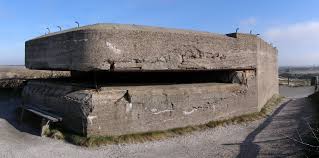
记忆方法
记忆“bunker”可以通过联想其结构特点。想象一个坚固、隐藏的“burrow”(洞穴或地道),这就是“bunker”的词源,是一种防御性的掩体或地下工事。因此,可以将“bunker”记作“坚固的burrow”。
以上内容由AI生成, 仅供参考和借鉴
中文词源
bunker 掩体
词源不详,可能来自bunk, 铺位。
英语词源
- bunker (n.)
- 1758, originally Scottish, "seat, bench," of uncertain origin, possibly a variant of banker "bench" (1670s; see bank (n.2)); possibly from a Scandinavian source (compare Old Swedish bunke "boards used to protect the cargo of a ship"). Of golf courses, first recorded 1824, from extended sense "earthen seat" (1805); meaning "dug-out fortification" probably is from World War I.
权威例句
- 1. I play normal bunker shots with an open stance.
- 我打一般的沙坑球采取开立击球姿势。
- 2. Frost holed a bunker shot from 50 feet to snatch the title by one stroke.
- 弗罗斯特在50英尺外的沙坑中击球入穴,以一杆的优势获得冠军。
- 3. In the electric light of bunker much remained to be done.
- 在地下避弹室的灯光下,还有许多事情要做.
- 4. On April 26 he quietly left the bunker.
- 4月26日那天,他悄悄地离开了地下避弹室.
- 5. Llitler's blowup came at the daily military conference in the bunker at 3 p.m.
- 希特勒在下午三点每天例行的地下室军事会议上大发雷霆.